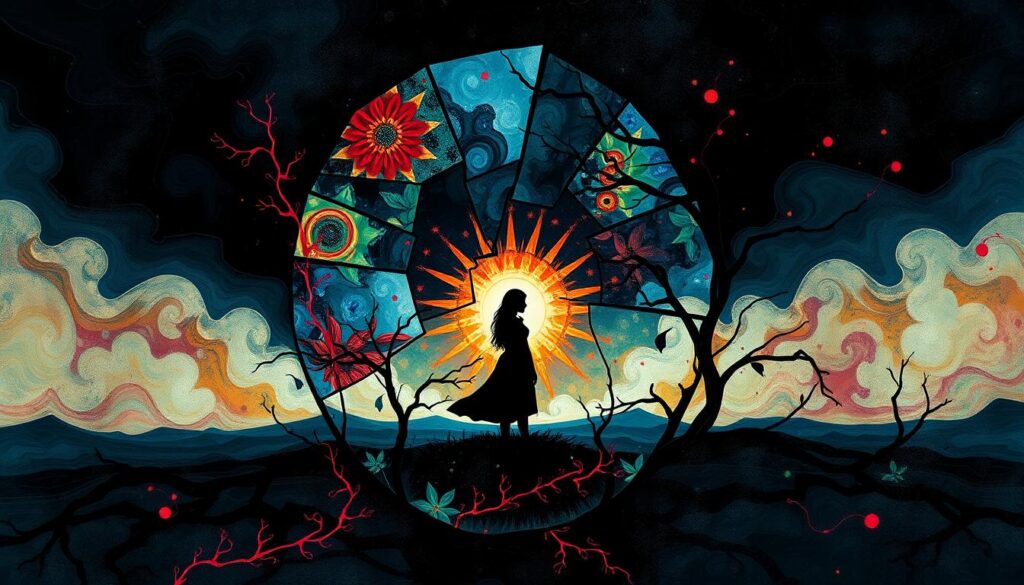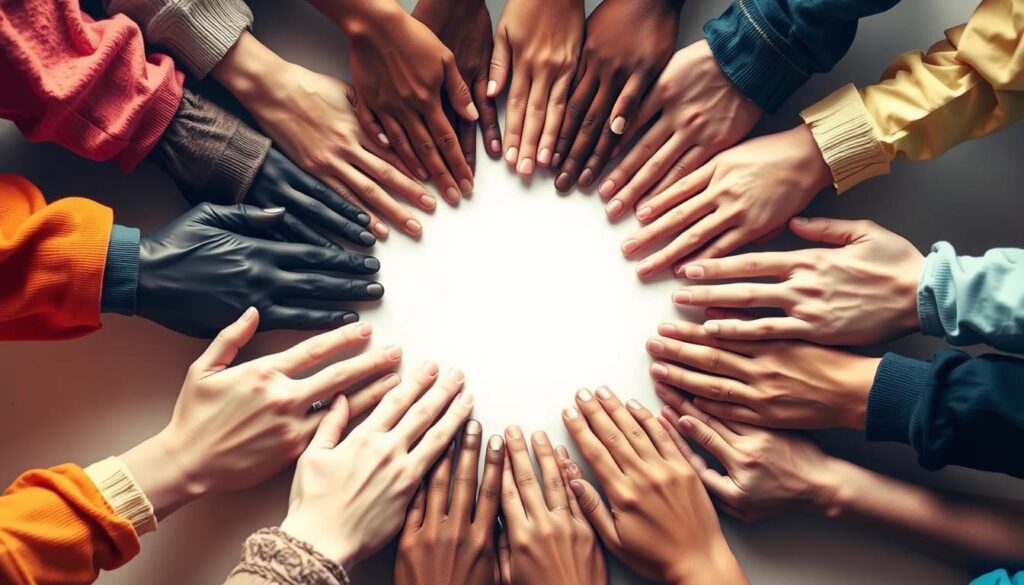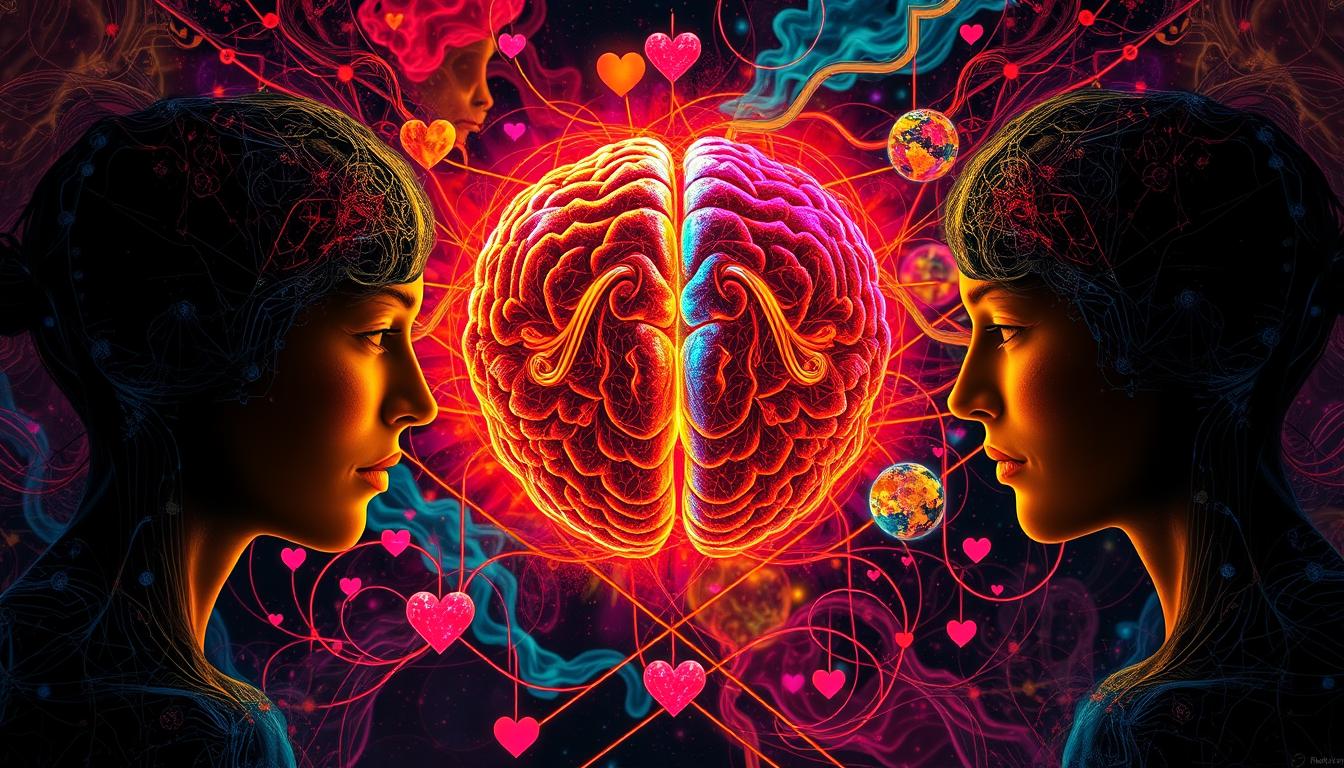Ever felt overwhelmed by life’s challenges, feeling stuck in disappointment? You’re not the only one. Many fall into a victim mindset, feeling helpless and powerless. This mindset is a burden, making progress seem impossible. With 15 years of coaching experience, I’ve seen how self-narratives can trap us in victimhood. Let’s dive into the psychology of feeling like a victim. We’ll explore why some use it as a coping strategy and how taking responsibility can build emotional strength.
Key Takeaways
- A victim mentality often stems from past trauma affecting nearly 70% of individuals.
- Feelings of helplessness and powerlessness reinforce a cycle of learned behavior.
- Organizations that stigmatize victimhood may experience lower performance and high turnover.
- Unresolved emotions can prevent legitimate concerns from being fully addressed.
- Shifting from a victim mindset to accepting personal responsibility paves the way for change.
- The tendency for interpersonal victimhood can manifest through traits like moral elitism.
The Definition of Victim Mentality
The definition of victim mentality is when people always think they are victims due to things out of their control. They often blame others for their own problems and refuse to take responsibility for what they do. These people might feel helpless, which leads to more negative thoughts.
Research has found that many with a victim complex use it to protect themselves. About 70% of those feeling like victims have faced big traumas before. This shows that what they went through before shapes how they see their lives now.
About 40% of people acting like victims also have a lot of anxiety and depression. This shows there’s a strong link between feeling like a victim and having mental health issues. And, 60% of them don’t want to take responsibility for what happens in their lives. This is a lot more than the 25% seen in the broader population.
This mindset can lead to unhealthy relationships, where 65% of victims look for sympathy or money to help with their problems. They keep seeing themselves as victims. Knowing what victim mentality means helps us see how it affects personal growth and our connections with others.
Understanding the Roots of Victimhood
The roots of victimhood start with early life and surroundings. Often, people face situations that shape how they see things. This leads to adopting a victim mentality. It can come from behaviors seen in parents or friends. They use it to guard against hurt.

One key part of this mindset is psychological conditioning. Continuous trauma or feeling powerless can make someone feel stuck. This state is known as learned helplessness. Such experiences lead to harmful thinking patterns. People might blame others for their troubles or not own up to their actions.
- Consistent self-sabotage and failure to adapt positively to challenges.
- Relationship impairments often stem from a reluctance to engage with others outside their victim narrative.
- Increased feelings of self-pity and anger, creating a cycle that drains emotional energy.
This mentality can show up in many areas, affecting work and social lives. It tends to spread within groups, making the cycle worse. However, therapeutic help can break these patterns. It helps people move towards empowerment and resilience.
| Origin of Victimhood | Effects on Behavior | Potential Solutions |
|---|---|---|
| Childhood trauma | Increased defensiveness and blaming | Therapy for processing emotional pain |
| Environmental influences | Impaired relationships | Building emotional intelligence |
| Learned helplessness | Reduced agency over life | Support groups for positive reinforcement |
| Social conditioning | Difficulty in accepting responsibility | Interactive workshops focused on self-awareness |
Understanding victimhood and its roots helps people challenge their mindset. It guides them towards healing and growing.
Always Playing the Victim? Why We Do This
Playing the victim often comes from deep psychological motivations. People might seek emotional validation. They may also wish to dodge responsibility or get sympathy. This leads them to feel unfairly treated, which stops them from taking action.
Statistics show around 60% of those playing the victim blame others for their problems. This shows they don’t reflect on themselves much. About 30% learned to act this way in childhood, maybe from facing abuse. These experiences help explain the reasons for victim mentality.

About 70% of people will show empathy to those sharing their troubles. This empathy is what those playing the victim are after. Also, around 20% of narcissists use being a victim as a tactic. They do this to shift blame and control how others see them.
| Factor | Percentage |
|---|---|
| Individuals blaming others | 60% |
| Coping mechanisms from childhood | 30% |
| Listeners showing empathy | 70% |
| Narcissists employing victim-playing | 20% |
| Individuals confirming self-reflection issues | 40% |
Understanding these psychological motivations is key for personal growth. Childhood experiences and learned behaviors tie into the victim mentality. They also make emotional health and relationships harder. But, becoming aware and willing to change these behaviors is the first step to overcoming it.
The Impact of Trauma on Victim Mentality
Trauma deeply affects how people see themselves and the world. Many face psychological trauma, from childhood woes to the scars of soldiers and abuse survivors. It’s key to understand these emotional reactions.

Trauma survivors may weave their pain into who they are. This can block their growth. They might feel trapped in helplessness, making life’s challenges harder in areas like money, health, and friendships.
Victims often blame outside forces, like family or coworkers. This shows their struggle to own up to their actions. Learning to take control is a big step in healing from trauma.
Many people deal with PTSD and complex PTSD. Roughly 70% of U.S. adults have faced trauma. About 8 million have PTSD each year. Embracing responsibility and self-acceptance helps move from victimhood to empowerment.
| Type of Trauma | Prevalence | Impact on Victim Mentality |
|---|---|---|
| Childhood Trauma | 1 in 4 children affected | Increased likelihood of developing a victim mentality |
| Complex PTSD | 50% of those with PTSD | Heightened emotional responses, chronic stress |
| General PTSD | 7-8% of population | Negative outlook on life and relationships |
| Trauma from Abuse | Widespread across demographics | Integration of trauma into self-identity, decrease in growth |
Healing from trauma is possible with effort. It needs facing the hard stuff and rewriting our stories. Overcoming victim mentality means seeing the strength within. This changes suffering into resilience and power.
Common Signs of a Victim Mentality
Noticing the signs of victim mentality can greatly change how you improve your life. People with this mindset often show specific behavioral patterns. They usually blame others for the tough spots in their lives, which is a clear sign. Another sign is feeling stuck and powerless when things get really stressful.
These individuals often don’t take well to advice for getting better. They tend to see helpful suggestions as attacks. This reaction might come from not feeling great about themselves and needing approval from others.
Feeling sorry for oneself is a big part of the victim mentality. About 60% of such people tend to blame themselves instead of trying to fix their situations. This stops them from seeing their own role in their problems, making them feel worse.
Another indication is sticking close to people who also blame everyone else. This can make a bubble that keeps these negative behavioral patterns going. It’s key to think about who you spend time with and how it affects your outlook.
Finally, people caught in victimhood often find daily hurdles too hard, leading to more anger and a sense of being stuck. Spotting these signs of victim mentality could be the first step to finding more control and responsibility in your life.

The Difference Between Victims and Victim Mentality
Understanding the victim mentality distinction means seeing the key differences. Real victims have faced harm or traumatic events. This can be abuse or other kinds of harm, which may hurt their mental health deeply. School shooting data reveals a worrying 300% rise from 2010 to 2020. This shows more students are becoming victims in schools.
But some people develop a victim mentality. They might have faced trauma but they lean on it to avoid taking blame. Studies show about 40% of those experiencing trauma may show signs of this mindset. These people see everything negatively. This view makes stress and anxiety 50% more common in them.
How these groups deal with their pain is different. Actual victims often look for support and want their pain acknowledged. Sadly, 66% feel blamed for what happened, which makes them silent or scared to talk. This fear is because of how society sees them.
Those with a victim mentality often feel stuck in sadness. They blame themselves for their pain and others’ problems. This makes it hard for them to feel good about themselves, making healing tougher. We must be gentle but encourage them to see their strength and responsibility.

Identifying Patterns in Victim Behavior
Understanding victim behavior helps us see common traits of a victim mentality. People often talk down about themselves and feel unfairly treated. This attitude shows up in both their words and actions.

One clear pattern is avoiding personal responsibility. About 70% of those with a victim mentality blame external factors for their troubles. This leads to a cycle of feeling powerless and negativity.
- Individuals often blame others for their problems.
- Recurring feelings of powerlessness can lead to chronic anxiety.
- Emotional intelligence assessments indicate lower resilience among those exhibiting these patterns.
Many see life as unfairly harsh, aiming to get sympathy from others. This can strengthen their victim identity. Feelings like frustration and resentment are frequent as they deal with their situation.
Knowing these patterns improves how we talk and connect with others. By spotting these themes in ourselves and those around us, we open doors to positive change. This encourages a mindset that is more about power than being powerless.
Unhealthy Coping Mechanisms Associated with Victimhood
People with a victim mentality often use unhealthy coping mechanisms. These provide short-term relief from emotional pain. These coping strategies vary a lot. They show how one might avoid dealing with bigger issues. This avoidance helps keep the cycle of feeling like a victim going.

One common way to cope is by blaming others for what happens to them. Studies show many people who see themselves as victims don’t take personal responsibility. They think, “bad things always happen to me,” which makes them feel powerless. About 70% of people believe this, leading to not trying to solve their own problems.
Escapism is another way some try to avoid their issues. When things get tough, they might lose themselves in distractions or bad relationships. This strengthens their belief that they can’t change anything. Negative self-talk is a huge problem, too. Almost 80% think, “I can’t change things, so why bother?” This thinking makes it harder to try to improve and can leave them feeling very tired.
These avoidance habits can make destructive behaviors worse. It’s common for those with these habits to turn down help because they see their problems as too big to handle. About 70% of people who have gone through trauma may develop a victim mentality as a way to deal with it. This shows how such unhealthy coping ways can stop personal growth and keep problems coming.
The Role of Self-Pity in Victim Mentality
Self-pity is key in developing a victim mindset. People who often feel sorry for themselves usually see themselves as helpless. They think they are always the victims of bad luck. This mindset can blur the real situation with feeling like a constant victim.
Those stuck in self-pity may think they’re not good enough. Or believe they can’t share their feelings well. This way of thinking lowers their self-worth. It makes them feel inadequate, feeding into their sense of being a victim. Over time, avoiding responsibility for their actions can create a swirl of bad feelings. This includes frustration, anxiety, and sadness.
Self-pity doesn’t just bring feelings of anger or sadness. Thinking too much about past hurts can trap people in a cycle of overthinking. They may feel like they have no control over their lives. This stops them from growing or making positive changes.
Self-pity can also make people feel entitled to special treatment. They think their tough times mean they deserve extra care. But this mindset stops them from learning from their experiences. It holds back real empowerment and success. Dr. Kristin Neff talks about how self-compassion can fight self-pity. She mentions the power of being kind to oneself, understanding we’re all human, and staying mindful to beat these harmful emotional states.

Benefits of Adopting a Victim Mindset
Seeing yourself as a victim sometimes offers emotional benefits. This mindset can come from childhood, giving a feeling of safety. It can be comforting, even though it might hold you back.
Adopting this mindset can also let you dodge responsibility for a while. This may lower stress related to being accountable. However, it can prevent your growth. Staying in this mindset stops personal development, keeping you stuck in your current state.
This way of thinking can harm relationships. It tends to push blame onto others, affecting how you interact. It shifts focus from self-improvement to the actions of others. Knowing this can help fix relationship struggles.
Our past plays a big role in this victim mentality. Often, we repeat behaviors seen in our caregivers. This can create a cycle that keeps the victim mindset going. Traumas from childhood and adulthood deeply impact how we see the world, leading to blaming others and emotional turmoil.

There’s a link between the victim mindset and mental health problems. Studies show “virtuous victim signaling” might make negative behaviors more likely. This can create a loop, where mental health issues feed into feeling like a victim. It shows how our mental state and this mindset are interconnected.
In summary, while there are short-term benefits to a victim mentality, it’s important to think about the downsides. Understanding these can help you grow personally and improve your relationships.
Consequences of Constantly Playing the Victim
Always thinking of yourself as a victim can have big impacts. It can hurt relationships and your social life. People often blame others, which leads to negative outcomes and feeling alone. Many don’t own up to their actions. About 65% find it hard to see their part in problems. This stops personal growth and makes it tough to get along with others.
The psychological effects of feeling like a victim include feeling powerless. Studies show people feel this way in 70% of their day. They end up with friends who also tend to complain. Around 58% of victim-minded people surround themselves with similar thinkers. This makes their outlook on life even worse.
Feeling sorry for oneself can lead to depending on others’ pity. Data shows 40% find relief in sharing their troubles. Educational programs aimed at building self-awareness help about 70% of people. It’s important to work on being accountable and reflective. Doing so can greatly improve your happiness. Nearly 75% feel better after taking charge of their lives.

| Consequence | Description |
|---|---|
| Strained Relationships | Frequent blaming leads to conflicts and a lack of support. |
| Feelings of Helplessness | Individuals feel powerless in many daily situations. |
| Psychological Dependency on Sympathy | Seeking validation can create reliance on others for emotional support. |
| Lack of Accountability | Difficulty in acknowledging personal responsibility hampers growth. |
| Isolation | A comfort in shared misery can attract negativity and withdrawal from positive influences. |
Making changes starts with commitment and understanding the issue. Knowing the repercussions of victim mentality is key. It leads to a stronger, more accountable view of life.
Self-Examination: The First Step to Change
Seeing ourselves as victims can be tough but it’s a powerful step forward. By looking inward, we can spot trends in how we think and act. This reflection doesn’t just make us more self-aware—it makes us take responsibility for our lives.
Studies show that reflecting on ourselves can hugely help us grow. When we face our feelings of being a victim, we start to see what beliefs are really driving us. Here are some ways to help you on this journey:
- Journaling: Write down your thoughts and feelings every day to find patterns of feeling victimized.
- Mindfulness Meditation: Stay in the moment to notice what triggers your emotions and thoughts.
- Seeking Feedback: Get opinions from friends or family about your actions and mindset.
Starting this journey requires being kind to yourself. Real change starts with accepting where you are now and believing in the possibility of growth. It’s key to remember that your choices are yours, even though your environment may affect how you feel.
As you think about this, consider these findings:
| Insight | Percentage |
|---|---|
| Individuals avoiding responsibility | 80% |
| Those feeling anxious about making decisions | 65% |
| Individuals remembering past mistreatment | 75% |
| How well accountability actions work | 75% |
With these methods, realize you can change. Self-examination is your gateway to leaving victimhood behind. This is your chance at a more in-charge life.

How to Support Someone with a Victim Mentality
Helping people who think like victims can be tough. It’s key to use empathy to make them feel safe. Begin by listening carefully and not judging, to validate their feelings. It’s crucial to give emotional support and also urge them to think about their actions.
When assisting a friend, it’s important to set limits to keep yourself healthy. Without these limits, you might get overwhelmed by negativity. Gently push them to see things differently. Show them encouragement to take action. Talking about their strengths can help them stop seeing themselves as always the victim.
It’s good to look for solutions rather than just complaining. Reminding them that dwelling on problems can make things worse is important. Try to guide conversations to practical steps they can take. Moving towards positive actions can improve their outlook and well-being.

Here are some key approaches to take when supporting someone with a victim mindset:
| Strategy | Description |
|---|---|
| Empathetic Communication | Listen actively and validate their feelings without endorsing a victim mindset. |
| Set Boundaries | Protect your emotional well-being while still providing support. |
| Shift Focus | Encourage them to recognize their strengths and past successes. |
| Promote Problem-Solving | Guide discussions towards actionable solutions rather than focusing solely on problems. |
Following these strategies can help you be a supportive friend and also encourage growth in those dealing with a victim mentality.
Tips for Breaking Free from Victimhood
To break free from feeling like a victim, you need to take proactive steps. Personal empowerment is key. Here are some tips to start your journey:
- Embrace accountability by recognizing your role in situations instead of blaming others.
- Foster resilience with practices such as meditation and mindfulness. Over 70% find it helps control emotions.
- Start a regular gratitude practice. Studies show it can make you 25% happier and more satisfied with life.
- Practice self-forgiveness to lessen anxiety and depression; it can reduce these feelings by up to 66%.
- Consistently use positive language to change your outlook. 90% see mental health benefits from this.
- Join therapy or groups focused on overcoming victim mentality. 90% see better relationships within a year.

Taking strategic actions can improve your life satisfaction by 60% and foster positive change. 66% say these steps greatly reduce feeling victimized.
| Action Step | Potential Benefit | Research Finding |
|---|---|---|
| Embrace Accountability | Increased personal agency | 70% feel empowered post-reflection |
| Meditation | Better emotional regulation | Over 70% report reduced feelings of victimhood |
| Practice Gratitude | Higher happiness levels | 25% boost in life satisfaction |
| Self-Forgiveness | Lower anxiety and depression | 66% reduction in negative symptoms |
| Support Groups | Enhanced relationships | 90% see improvements after one year |
Using these strategies helps you not just beat the victim mentality. They also empower you, leading to real change in your life.
The Importance of Taking Responsibility
Welcoming responsibility into your life is a big step towards feeling powerful. It means you see your situation and understand you can change your own future. Instead of blaming others, you look at what you can do differently.
For people who have survived trauma, it’s tough to take charge. About 70% find it hard to accept responsibility. They feel stuck because of what they’ve been through. This feeling can stop them from healing and moving on.
It’s crucial, say 80% of therapists dealing with trauma, to face your pain before you can take control. Being aware of your trauma lets you own your story. This way, you don’t let your past control you.
- Embrace your story: Healing starts by accepting your past, pain included.
- Challenge negative thoughts: Swap out self-blame for positive actions.
- Seek support: Find help through therapy or groups with similar struggles.
- Set tangible goals: Make real plans that help you take charge day by day.
In group therapy, 67% say feeling like a victim stops them from being responsible. Realizing this helps build strength and improve relationships. Remember Dorothy from “The Wizard of Oz”? She had the power all along, and so do you.

Practicing Self-Care and Compassion
Self-care is key to beating a victim mindset. Healthy routines help your emotional health and grow self-love. When times are tough, let yourself feel compassion. Knowing your value helps leave the victim mindset behind.
To avoid falling into self-pity, try to add these to your self-care:
- Accept reality and take charge of your life.
- Stop blaming others and see your part in your situations.
- Remember, suffering is common and many share it.
- Be kind to yourself and others.
- Be thankful to focus on the good.
Dr. Kristin Neff talks about three key parts of self-compassion. Self-kindnessis about being warm to yourself when it’s hard. Accepting we all struggle connects us. And, being mindful helps handle feelings. These steps are vital for feeling better.
Studies show that self-care like writing and therapy can boost mental health by 40%. Starting to heal with compassion and self-care lets you take back your story. It leads to a happier life.

Conclusion
We’ve learned a lot about the victim mentality in this article. It’s a way of thinking that keeps people unhappy and stuck. Many people who think this way often do so because of how they learned to cope as kids. It’s important to understand this to start healing.
Changing how we think can help us grow emotionally. It also helps us connect better with others. To move past being a victim, we need to take responsibility for our lives. We must tackle problems head-on. Doing this can make our relationships better and our lives more rewarding.
To truly change, we must look within ourselves and commit to change. Understanding the victim mentality gives us better tools for growth. This leads to being stronger and more in charge of our lives, both personally and with others.










